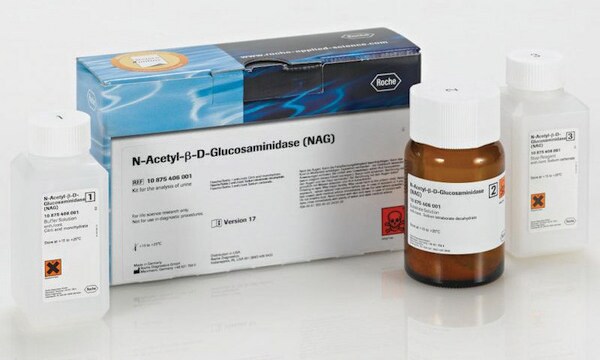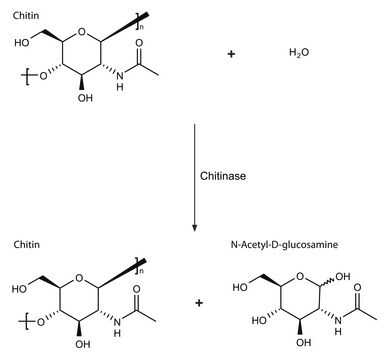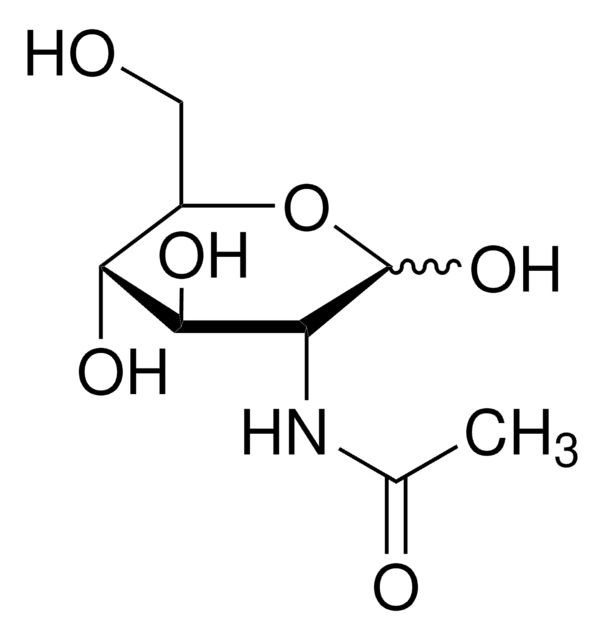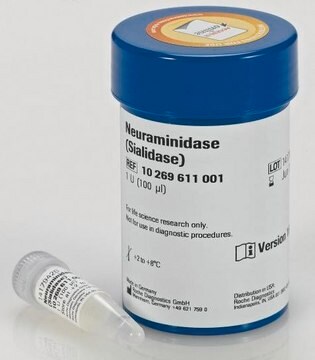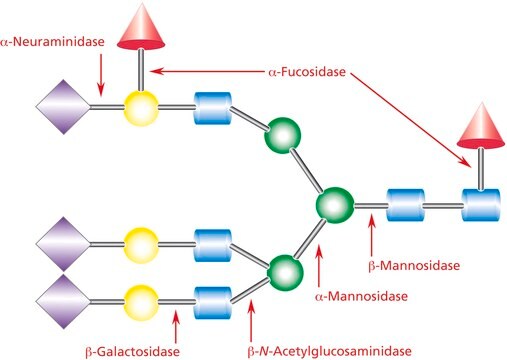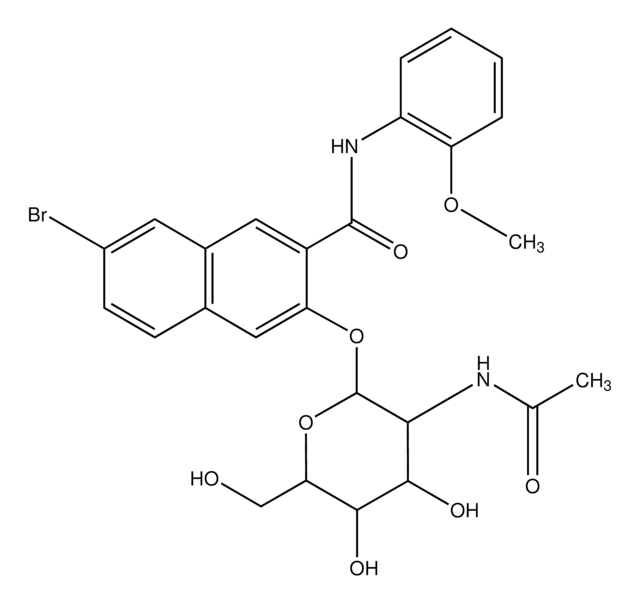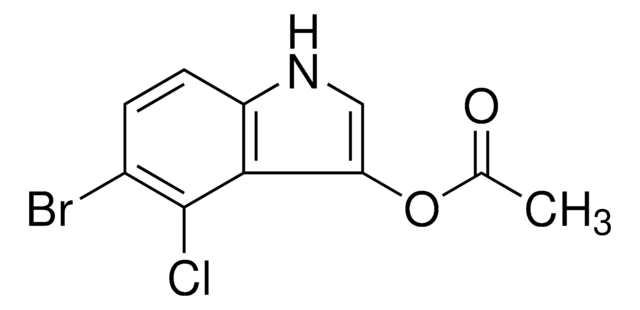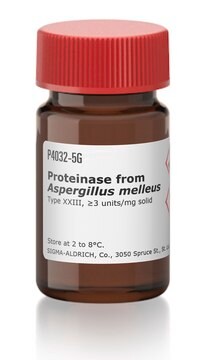A2264
β-N-Acetylglucosaminidase from Canavalia ensiformis (Jack bean)
ammonium sulfate suspension, ≥10 units/mg protein
Synonym(s):
β-N-Acetyl-D-hexosaminide N-acetylhexosaminohydrolase, β-N-Acetylhexosaminidase
Sign Into View Organizational & Contract Pricing
All Photos(1)
About This Item
Recommended Products
biological source
Canavalia ensiformis
Quality Level
form
ammonium sulfate suspension
specific activity
≥10 units/mg protein
foreign activity
α- and β-galactosidase, and α-L-fucosidase ≤0.1%
α-mannosidase ≤0.2%
storage temp.
2-8°C
Looking for similar products? Visit Product Comparison Guide
Application
β -N-acetylglucosaminidase is a lysosomal enzyme used to hydrolyze N-acetyl-β-D-glucosaminides and N-acetyl-β-Dgalactosaminides. It is used in chemoenzymatic synthesis of oligosaccharides based on their effective transglycosylation of β-GlcNAc and β-GalNAcc. It may be a useful tool to study Alzheimer′s Disease . Acetylglucosaminidase from Canavalia ensiformis has been used to study enzymic detachment of biofilms .
Biochem/physiol Actions
This enzyme, sometimes called β-N-acetylhexosaminidase, is reported to liberate terminal β-linked N-acetylglucosamine and N-acetylgalactosamine from a variety of substrates. The activity of β-N-actylglucosaminidase may be determined with the chromogenic substrate p-nitrophenyl-N-acetyl-β-D-glucosaminide. β-N-actylglucosaminidase hydrolyzes the terminal nonreducing N-acetyl-D-hexosamine residues. This enzyme contains two predominant isozymes, Hex A, a heterodimer, and Hex B, a homodimer. N-acetylglucosamine, acetamide, N-2-acetamido-2-deoyglucosylamine, N-acetylnojirimycin, and N-acetyldeoxynojirmycin are known inhibitors.
This enzyme, sometimes called β-N-acetylhexosaminidase, is reported to liberate terminal β-linked N-acetylglucosamine and N-acetylgalactosamine from a variety of substrates.
Unit Definition
One unit will hydrolyze 1.0 μmole of p-nitrophenyl N-acetyl-β-D-glucosaminide to p-nitrophenol and N-acetyl-D-glucosamine per min at pH 5.0 at 25 °C.
Physical form
Suspension in 2.5 M (NH4)2SO4, pH 7.0
Analysis Note
At pH 4.0, p-nitrophenyl β-N-acetylgalactosaminide is hydrolyzed at approximately 50% of the rate of hydrolysis of p-nitrophenyl β-N-acetylglucosaminide at pH 5.0.
inhibitor
Product No.
Description
Pricing
Storage Class Code
12 - Non Combustible Liquids
WGK
WGK 3
Flash Point(F)
Not applicable
Flash Point(C)
Not applicable
Choose from one of the most recent versions:
Already Own This Product?
Find documentation for the products that you have recently purchased in the Document Library.
Customers Also Viewed
Mohammed A Al-Fattani et al.
Journal of medical microbiology, 55(Pt 8), 999-1008 (2006-07-20)
Matrix material was extracted from biofilms of Candida albicans and Candida tropicalis and analysed chemically. Both preparations contained carbohydrate, protein, hexosamine, phosphorus and uronic acid. However, the major component in C. albicans matrix was glucose (32%), whereas in C. tropicalis
Chaeyoung Kim et al.
Neurobiology of aging, 34(1), 275-285 (2012-04-17)
Deposition of β-amyloid (Aβ) as senile plaques and disrupted glucose metabolism are two main characteristics of Alzheimer's disease (AD). It is unknown, however, how these two processes are related in AD. Here we examined the relationship between O-GlcNAcylation, which is
Douglas N Sanders et al.
Molecular genetics and metabolism, 108(1), 70-75 (2012-12-26)
GM2 gangliosidosis is a fatal lysosomal storage disease caused by a deficiency of β-hexosaminidase (EC 3.2.1.52). There are two major isoforms of the enzyme: hexosaminidase A composed of an α and a β subunit (encoded by HEXA and HEXB genes
Federica Vernuccio et al.
Recenti progressi in medicina, 103(12), 559-563 (2012-12-22)
Cardiorenal syndrome is a pathophysiological heart and kidney disorder, in which acute or chronic dysfunction of one organ induces a damage in the other. It's a syndrome more and more often encountered in clinical practice and this implies the need
Tyler Mark Pierson et al.
Molecular genetics and metabolism, 108(1), 65-69 (2012-11-20)
A 12 year-old female presented with a seven-year history of progressive muscle weakness, atrophy, tremor and fasciculations. Cognition was normal. Rectal biopsy revealed intracellular storage material and biochemical testing indicated low hexosaminidase activity consistent with juvenile-onset G(M2)-gangliosidosis. Genetic evaluation revealed
Articles
Instructions for working with enzymes supplied as ammonium sulfate suspensions
Our team of scientists has experience in all areas of research including Life Science, Material Science, Chemical Synthesis, Chromatography, Analytical and many others.
Contact Technical Service
